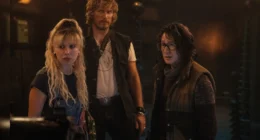Table of Contents Show
Introduction
Some stories enter the heart quietly, like a whisper on the wind, but refuse to leave once they are there. Stolen is one of those rare cinematic experiences — a tale that begins as a deeply personal wound and blossoms into a universal cry for justice. Released on Netflix in April 2024, this Swedish drama, directed by Elle Márjá Eira in her breathtaking feature debut, adapts the acclaimed 2021 novel by Ann-Helén Laestadius into a powerful visual journey. At its core, Stolen is not just a film about loss; it is about identity, cultural survival, and the enduring courage of one young woman determined to reclaim what was taken from her.
Watch the ‘Stolen’ Official Trailer
Plot Overview (Spoiler-Free)
In the snowy expanse of Sápmi — the traditional homeland of the Indigenous Sámi people — a young girl named Elsa lives a life intertwined with the rhythms of nature. At just nine years old, her world is shattered when she witnesses her beloved reindeer, Nastegallu, being poached. The act is cruel, deliberate, and wrapped in a chilling silence as Elsa is frightened into saying nothing.
A decade later, Elsa is no longer a child. She has grown into a woman carrying the weight of injustice on her shoulders, her memories as sharp as the Arctic wind. The poacher still walks free, unpunished by a system blind to the plight of her people. But this time, Elsa refuses to remain silent. What follows is a journey of defiance — a dangerous pursuit that pits her against prejudice, institutional apathy, and the deep-rooted scars of colonial oppression.
The beauty of Stolen lies in how it frames this intimate story within the wider context of Sámi struggles, allowing Elsa’s quest for justice to mirror the fight of an entire community for recognition and respect.
What Worked Well
One of the film’s greatest strengths is its authenticity. Director Elle Márjá Eira, herself of Sámi heritage, brings an insider’s understanding to every frame. The snow-laden landscapes are more than a backdrop — they are a living, breathing part of the story. Every gust of wind, every crunch of snow underfoot, feels real, grounding the viewer in Elsa’s world.
The performances are equally compelling. The actress portraying Elsa delivers a performance that is both restrained and volcanic, a slow burn of emotion that finally ignites in moments of raw intensity. Supporting characters, from family members to community elders, bring depth and texture to the narrative. Each one feels like a thread in the fabric of Sámi life, contributing to the authenticity of the film’s portrayal of a culture often overlooked by mainstream cinema.
The sound design and score are subtle but deeply affecting. Instead of overwhelming the narrative, the music seeps into it — a haunting blend of traditional Sámi joik chants and modern composition. It acts like an emotional compass, guiding viewers through moments of quiet grief and fierce determination.
What Didn’t Work
While Stolen is a beautifully crafted piece of cinema, its deliberate pacing may not suit everyone. Viewers expecting a rapid-fire revenge thriller might find themselves restless during the film’s slower, more meditative moments. Yet these pauses are essential to its emotional rhythm, allowing space for reflection.
Additionally, some audiences unfamiliar with Sámi history and culture might feel certain themes are underexplained. The film assumes a degree of background knowledge, which can be enriching for those willing to research but potentially alienating for those seeking a more straightforward narrative.
Final Verdict
Stolen is more than a film — it is a reclamation. It is a story about stolen lives, stolen voices, and the strength it takes to rise against centuries of silence. Elsa’s journey resonates not only as an individual’s pursuit of justice but also as a reflection of the resilience of Indigenous cultures worldwide.
Elle Márjá Eira’s directorial debut is a triumph of sincerity and vision, delivering a cinematic experience that lingers long after the credits roll. For those willing to embrace its pace and immerse themselves in its world, Stolen offers a rare kind of storytelling — one that feels as timeless as the snow-covered lands it portrays.
Rating: 8.5/10 — A poignant and beautifully shot drama that transforms a deeply personal tragedy into a universal tale of courage.
Meta Tags
- Genre: Drama, Crime, Indigenous Stories
- Language: Swedish
- Release Date: April 12, 2024











